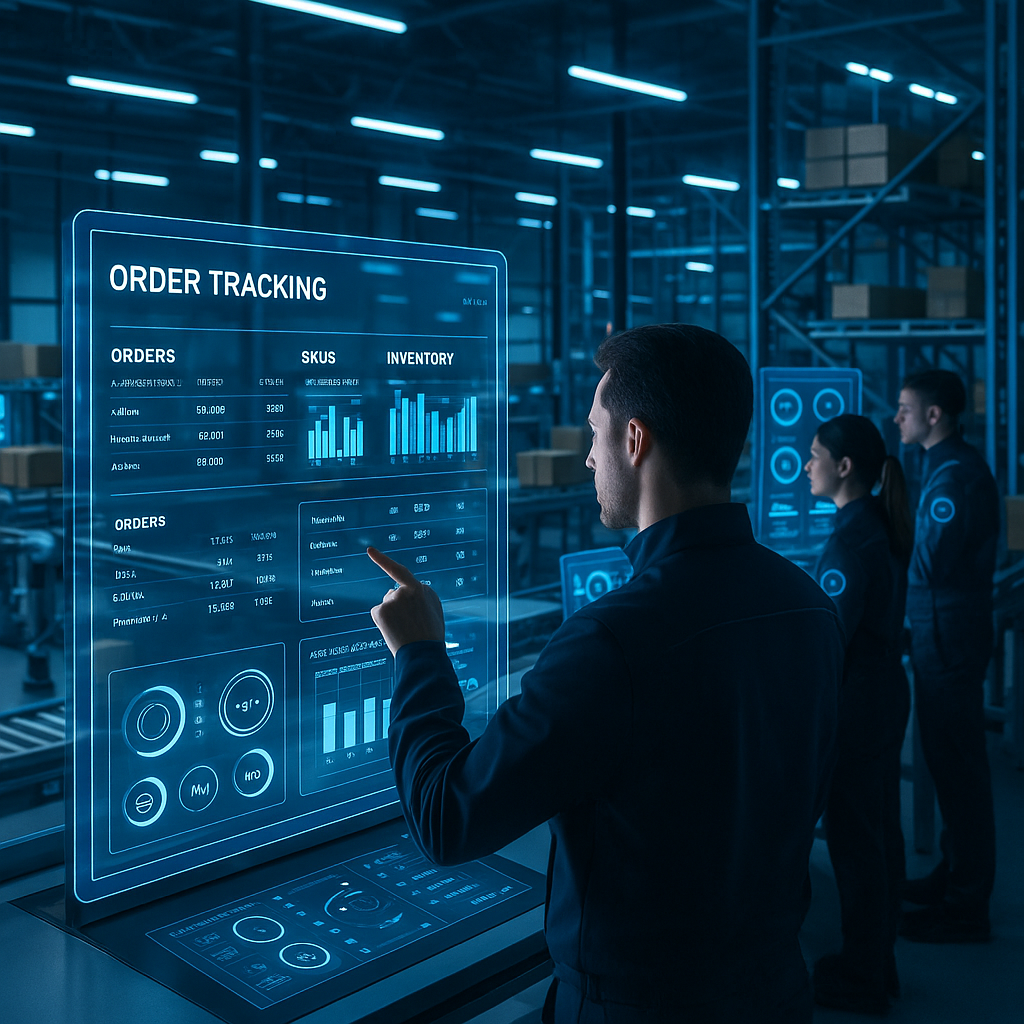B2B Order Fulfillment Issues That Hurt Performance—And How to Fix Them
Every failed fulfillment isn’t just a bad shipment. It’s a broken promise to your partners. How many contracts slipped last quarter because of...
In the 1990's we started a software company with a team spread-out across the country working remotely. No software solution existed that would allow us to streamline our operations and improve efficiency - so we built our own.
“Working at NEX has been a game-changer for me. I’ve never been part of a team so committed to innovation and collaboration. Every day, I feel like my ideas truly make an impact.”
— Jordan M., Product Manager

Discover how NEX significantly enhanced First Atlantic Commerce's
operations, billing processes, and overall data management efficiency.
6 min read
NEX Marketing : Oct 4, 2023 10:14:32 AM
The understanding of order fulfillment differences between B2B and B2C transactions is a crucial aspect of managing business operations effectively.
B2B order fulfillment encompasses the delivery of goods from one business to another, typically involving bulk shipments of raw materials. Efficient and cost-effective services are essential to maintain business relationships and reputation.
Conversely, B2C order fulfillment concentrates on directly delivering finished products to consumers. This type of fulfillment is easier to handle, often accompanied by additional services such as free shipping and order tracking. Customer satisfaction and timely delivery are pivotal in B2C order fulfillment.
Gaining insight into these disparities allows businesses to offer valuable services and optimize their operational processes.
The differences between B2B and B2C order fulfillment encompass factors such as the size of product shipments, pricing and services, customer support, purchasing behavior, and order frequency.
In B2B order fulfillment, the size of product shipments tends to be larger as it involves bulk orders of raw materials. On the other hand, B2C order fulfillment deals with smaller product sizes, as it focuses on delivering finished products directly to consumers.
In terms of pricing and services, B2B order fulfillment provides pricing and services based on the recipient business’s requirements, while B2C transactions have fixed prices for everyone. Moreover, B2C order fulfillment often includes additional services like free shipping, customer support, and order tracking.
Customer support also differs between B2B and B2C order fulfillment, with B2B offering personalized support, while B2C customers require little to no sales assistance.
Purchasing behavior also diverges between the two, as B2C purchases are based on emotions and personal preferences, while B2B purchases require careful consideration and negotiation.
Furthermore, order frequency varies, with B2C purchases being single transactions, while B2B shipments are larger and ordered multiple times throughout the year.
Efficient and cost-effective services are crucial in B2B order fulfillment to maintain business relationships and reputation. B2B order fulfillment involves delivering goods from one business to another, often in bulk shipments of raw materials.
One of the main challenges in B2B order fulfillment is the need for reliable and quick order delivery. To address this challenge, B2B fulfillment centers aim to provide efficient transportation and logistics services.
Additionally, many large businesses use Electronic Data Interchange (EDI) software to integrate their warehouses with B2B fulfillment service providers, streamlining the order fulfillment process.
Another challenge in B2B order fulfillment is the potential influence of trade barriers. However, advanced reporting software and management systems can help mitigate risks and ensure smooth operations.
Overall, implementing effective B2B order fulfillment strategies is essential for businesses to meet the demands of their clients and maintain successful partnerships.
Analyzing B2C order fulfillment in detail, the focus is on delivering finished products directly to consumers. B2C order fulfillment is characterized by the delivery of smaller product sizes and does not involve bulk shipments.
Providers of B2C order fulfillment often offer additional services like free shipping, customer support, and order tracking to ensure customer satisfaction. Timely delivery and meeting customer expectations are essential requirements in B2C order fulfillment to maintain customer loyalty.
However, there are challenges in B2C order fulfillment that businesses need to address.
These challenges include managing high volume orders during peak seasons, ensuring accurate inventory management to avoid stockouts, and handling returns and exchanges efficiently.
Key distinctions exist between the methods of order fulfillment in B2B and B2C settings.
Effective B2B order fulfillment requires key considerations such as providing efficient and cost-effective services to maintain business relationships and reputation. B2B fulfillment centers aim to deliver bulk shipments of raw materials reliably and quickly. Large businesses often use EDI software to integrate their warehouses with B2B fulfillment service providers. Trade barriers can influence B2B order fulfillment, but advanced reporting software and management systems can mitigate risks.
On the other hand, B2C order fulfillment focuses on delivering finished products directly to consumers. Customer experience is crucial in B2C order fulfillment, with additional services like free shipping, customer support, and order tracking being offered. B2C order fulfillment is easier to handle as it does not involve bulk shipments.
Overall, B2B order fulfillment prioritizes efficient and cost-effective services, while B2C order fulfillment emphasizes customer experience.
When comparing order fulfillment in B2B and B2C settings, it is important to consider the unique requirements and characteristics of each type of transaction. Efficient inventory management is crucial in both B2B and B2C order fulfillment to ensure timely delivery and avoid stockouts or overstocking.
In B2B settings, businesses often rely on advanced reporting software and management systems to mitigate risks associated with trade barriers and ensure smooth operations.
On the other hand, B2C order fulfillment places a high emphasis on customer support and satisfaction. B2C providers often offer additional services such as free shipping, order tracking, and responsive customer support to enhance the customer experience.
Understanding these differences is essential for businesses to tailor their order fulfillment processes accordingly and meet the specific demands of each type of transaction.
Challenges and costs arise in both B2B and B2C order fulfillment due to factors such as inventory management, shipping expenses, and the need to meet customer demands.
In B2B order fulfillment, managing inventory can be complex as it involves tracking and replenishing bulk shipments of raw materials. Additionally, B2B shipments often require specialized equipment and higher shipping costs due to the larger volume of orders. B2B order fulfillment also faces challenges in meeting the specific requirements of individual businesses and maintaining strong partnerships with clients.
On the other hand, B2C order fulfillment involves handling smaller product sizes, but requires efficient inventory management to meet the demands of individual customers. B2C order fulfillment providers incur costs related to offering additional services like free shipping, customer support, and order tracking. Furthermore, B2C order fulfillment must ensure timely delivery and customer satisfaction to retain customers.
Overall, both B2B and B2C order fulfillment face challenges and costs, but they differ in terms of inventory management, shipping expenses, and customer demands.
One approach to achieving successful order fulfillment in both B2B and B2C settings involves implementing efficient inventory management systems.
In B2C order fulfillment, customer support plays a crucial role in ensuring customer satisfaction. Providing additional services such as free shipping, order tracking, and responsive customer support can enhance the overall customer experience.
On the other hand, in B2B order fulfillment, strategies for managing trade barriers are essential. Advanced reporting software and management systems can help mitigate risks associated with trade barriers. These systems can provide real-time information on inventory levels, delivery schedules, and customs requirements, allowing businesses to navigate trade barriers effectively.
The key factors that differentiate B2B and B2C order fulfillment include:
The impact of technology on order fulfillment efficiency: In B2B order fulfillment, technology plays a crucial role in integrating warehouses and streamlining operations. This allows for efficient processing of large bulk orders and ensures timely delivery. On the other hand, B2C order fulfillment focuses on delivering finished products directly to consumers. Technology enables additional services like free shipping and allows for efficient tracking of individual orders.
The importance of inventory management: In B2B order fulfillment, efficient inventory management is vital to ensure timely delivery of bulk shipments. This involves accurately tracking stock levels, managing reorder points, and coordinating with suppliers to avoid stockouts. On the other hand, B2C order fulfillment requires effective inventory management to meet customer demands in a timely manner. This involves tracking individual product availability, managing returns, and ensuring stock replenishment to meet consumer demand.
Overall, while both B2B and B2C order fulfillment require technology and efficient inventory management, the specific focus and requirements differ. B2B order fulfillment emphasizes integration and efficiency for bulk orders, while B2C order fulfillment focuses on individual customer satisfaction and timely delivery.
B2B order fulfillment differs from B2C order fulfillment in terms of transportation and shipping.
In B2B order fulfillment, transportation involves bulk shipments of raw materials, whereas B2C order fulfillment deals with smaller product sizes.
B2B shipments require efficient warehouse management to handle large quantities, while B2C shipments focus on inventory management challenges to meet individual customer demands.
Moreover, B2B transportation often involves close partnerships with clients, while B2C transportation emphasizes low-cost or free shipping with shorter delivery times.
The specific challenges and costs associated with B2B order fulfillment compared to B2C order fulfillment include the impact on inventory management and the importance of communication and collaboration.
B2B order fulfillment often involves larger volumes and more complex inventory management due to the bulk shipments of raw materials.
Additionally, B2B order fulfillment requires close communication and collaboration with clients to meet their specific requirements, which can add to the costs and challenges of the process.
To ensure successful B2B and B2C order fulfillment, businesses can implement strategies such as order accuracy optimization and inventory management efficiency.
These strategies aim to improve the accuracy of order processing and minimize errors in order fulfillment. By implementing technologies like automated order management systems and barcode scanning, businesses can streamline their order fulfillment processes and reduce the chances of errors.
Additionally, efficient inventory management practices, such as real-time inventory tracking and demand forecasting, can help businesses meet customer demands in a timely manner and avoid stockouts or overstock situations.
Returns and refunds are handled differently in B2B and B2C order fulfillment processes.
In B2B order fulfillment, returns and refunds are typically more complex due to the higher value of orders and the need for clear policies. B2B providers often have specific procedures in place to handle returns, such as requiring prior authorization and restocking fees.
In contrast, B2C order fulfillment processes are generally more customer-centric, with easier return and refund policies to ensure customer satisfaction.
The impact of returns and refunds on B2B and B2C order fulfillment can vary, but both types of businesses strive to minimize these occurrences to maintain efficient operations.
After reviewing the key differences between B2B and B2C order fulfillment, businesses need advanced software solutions to streamline their operations. NEX is a leading workflow management software worth exploring that helps orchestrate order management and fulfillment processes. NEX integrates with major ERP and financial software to provide end-to-end visibility and control over the order lifecycle. By automating manual tasks, enabling collaboration across teams, and providing real-time analytics, NEX can optimize order fulfillment workflows for both B2B and B2C businesses. Implementing NEX can lead to increased efficiency, accuracy, and customer satisfaction in order fulfillment processes.

Every failed fulfillment isn’t just a bad shipment. It’s a broken promise to your partners. How many contracts slipped last quarter because of...

4 min read
Is your team still relying on manual processes to handle sales orders? As of early 2025, 70% of B2B sales orders are still processed...

B2B organizations are under increasing pressure to manage orders with precision, speed, and full supply chain visibility. However, persistent...